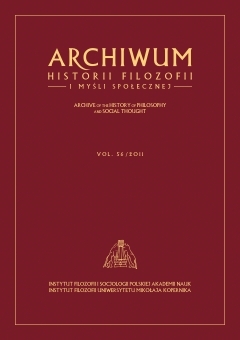Uczta mędrców czy sofistów? Wokół antyfilozoficznej wymowy dialogu Atenajosa
The Learned Banqueteurs or the Deipnosophists? About the Anti-Philosophical Significance of Athenaeus’ Dialogue
Author(s): Marian Andrzej WesołySubject(s): Ancient Philosphy, Translation Studies, Rhetoric
Published by: Instytut Filozofii i Socjologii Polskiej Akademii Nauk
Keywords: Athenaeus; Deipnosophists; anti-platonism; ancient philosophy; sophists;
Summary/Abstract: In recent translations of Athenaeus the title is rendered as The Learned Banqueteurs, thereby it loses the traditional sense of a controversy between sophists and philosophers. However, the deipnosophists were learned men or scholars neither in the ancient nor in the modern understanding of the term. Unfortunately, almost all translations erroneously render the instructive remark of the Byzantine Epitomator that “Athenaeus imitates Plato in his dramatization of the dialogue” (see below the motto). As a matter of fact, the Epitomator refers to the fact that Athenaeus jealously competes with Plato’s mimetic dramatization and aims completely to overcome it. We may, therefore, highlight here the entire anti-philosophical message of this spectacular and sophisticated dialogue.
Journal: Archiwum Historii Filozofii i Myśli Społecznej
- Issue Year: 56/2011
- Issue No: 56
- Page Range: 69-79
- Page Count: 11
- Language: Polish

